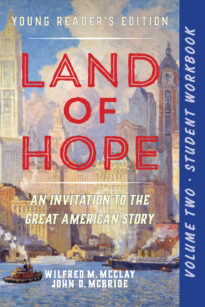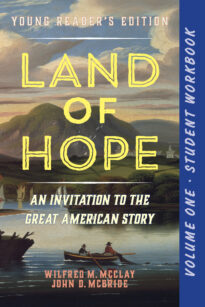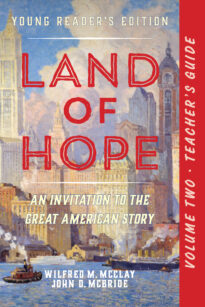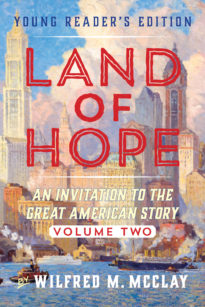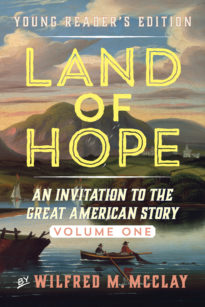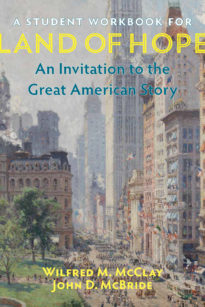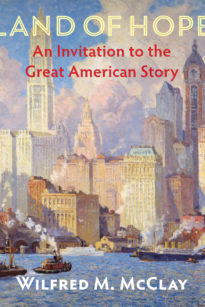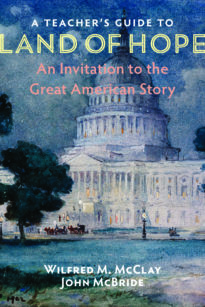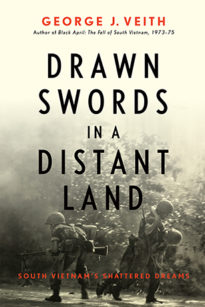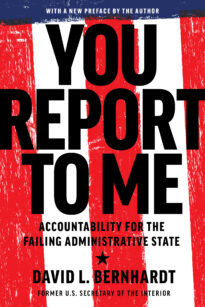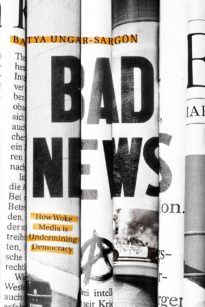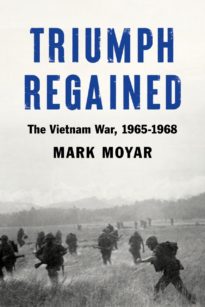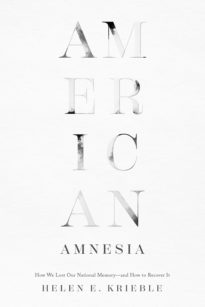Free shipping on all orders over $40
- 39 Results
- Search Again
A Student Workbook for Land of Hope: An Invitation to the Great American Story Young Reader's Edition, Volume Two
The Student Workbook is intended to be used with the Teacher’s Guide. The purpose of the Student Workbook is to assist students in working through the LAND OF HOPE text with a close reading, and also to add some depth through the supplementary documents.
A Student Workbook for Land of Hope: An Invitation to the Great American Story Young Reader's Edition, Volume One
The Student Workbook is intended to be used with the Teacher’s Guide. The purpose of the Student Workbook is to assist students in working through the LAND OF HOPE text with a close reading, and also to add some depth through the supplementary documents.
Young Reader’s Edition to Land of Hope (Volume Two) An Invitation to the Great American Story
By the dawn of the twentieth century, the United States had become the world’s greatest economic power and an increasingly important actor on the world stage. Yet success presented a challenge to the country not to lose sight of its heritage of constitutional liberty and the virtues that had made its flourishing possible. That challenge remains for us today.
Young Reader’s Edition to Land of Hope (Volume One) An Invitation to the Great American Story
From its beginnings America was a land of hope, a magnet for those seeking a new beginning for themselves. The American Founders created a unique plan of government designed to realize those ideals. Implementing the plan was not easy, though, and a bloody civil war would push the American experiment to the breaking point — and to a new birth of freedom.
A Student Workbook for Land of Hope An Invitation to the Great American Story
This Student Workbook for Wilfred M. McClay’s Land of Hope: An Invitation to the Great American Story will be an invaluable supplemental resource for students and teachers who use Land of Hope as a textbook for courses in U.S. history. Prepared by Dr. McClay in collaboration with Dr. John McBride, a master teacher with more than thirty years of secondary and collegiate teaching experience, it is an exceptionally rich and useful tool for classroom instructors.
Land of Hope An Invitation to the Great American Story
For too long we’ve lacked a compact, inexpensive, authoritative, and compulsively readable book that offers American readers a clear, informative, and inspiring narrative account of their country. Such a fresh retelling of the American story is especially needed today, to shape and deepen young Americans’ sense of the land they inhabit, help them to understand its roots and share in its memories, all the while equipping them for the privileges and responsibilities of citizenship in American society.
A Teacher’s Guide to Land of Hope An Invitation to the Great American Story
This Teachers’ Guide to Wilfred McClay’s Land of Hope: An Invitation to the Great American Story will be an invaluable supplemental resource for teachers who use Land of Hope as a textbook for courses in U.S. history.
Land of Hope An Invitation to the Great American Story
We have a glut of text and trade books on American history. But what we don’t have is a compact, inexpensive, authoritative, and compulsively readable book that will offer to intelligent young Americans a coherent, persuasive, and inspiring narrative of their own country.
Drawn Swords in a Distant Land South Vietnam's Shattered Dreams
Drawn Swords in a Distant Land showcases the fascinating, untold story of the rise and fall of the Republic of Vietnam. Putting aside outdated ideological debates, it offers the first in-depth review of the South Vietnamese successes and failures in building and defending their state.
You Report to Me Accountability for the Failing Administrative State
In You Report to Me, Bernhardt provides a firsthand chronicle of how the bureaucratic swamp really works and reveals how unaccountable power has quietly concentrated in the administrative state over the last two decades.
Bad News How Woke Media Is Undermining Democracy
Something is wrong with American journalism. Long before “fake news” became the calling card of the Right, Americans had lost faith in their news media. But lately, the feeling that something is off has become impossible to ignore. That’s because the majority of our mainstream news is no longer just liberal; it’s woke. Today’s newsrooms are propagating radical ideas that were fringe as recently as a decade ago, including “antiracism,” intersectionality, open borders, and critical race theory. How did this come to be?
Triumph Regained The Vietnam War, 1965-1968
Triumph Regained: The Vietnam War, 1965-1968 is the sequel to the immensely influential and controversial Triumph Forsaken: The Vietnam War, 1954-1965. Like its predecessor, this book overturns the conventional wisdom using a treasure trove of new sources, many of them from the North Vietnamese side. Rejecting the standard depiction of U.S. military intervention as a hopeless folly, it shows America’s war to have been a strategic necessity that could have ended victoriously had President Lyndon Johnson heeded the advice of his generals.
American Amnesia How We Lost Our National Memory—and How to Recover It
If people, communities, or even nations lose their memory, they lose their character. That is why cultures throughout the world work at maintaining their identity and passing traditions along to future generations. But what if a nation purposely decides it no longer wants to remember its history? Helen Krieble writes that America cannot be preserved as “the last best hope of Earth” if its own people no longer understand why that is true and are no longer willing to do what it takes to preserve it.
